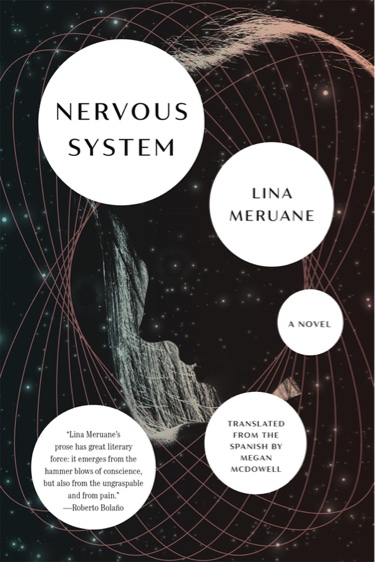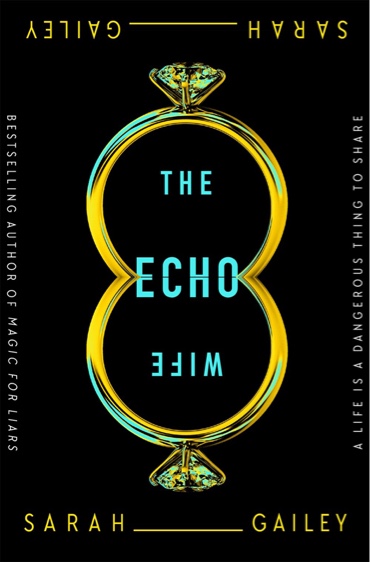-
March 24, 2022
Quarterfinals
-
Lina Meruane
4Nervous System
v.
3The Echo WifeSarah Gailey
-
Judged by
Olivia Craighead
What scientists do is none of my business. The dumbest scientist in the world is approximately six times as smart as I am, and I would trust them to tell me just about anything. A dumb scientist could tell me that they were working on a way to make antibiotics out of monkey spit and I would say, “Huh, rock on, I guess,” and never question it. This is all to say, that while I trust scientists with my life, I do not have a lot of capacity to care or understand about their academic work either in reality or fiction.
But in the words of famed scientist Dr. Ian Malcolm, life finds a way, and this time life found a way to make me engage with science. So here I am, tasked with reading two incredibly different books about female scientists who keep secrets and fail and reflect on their pasts before ending up unsteadily—but somewhat contentedly—looking to the future.
Receiving The Echo Wife by Sarah Gailey and Nervous System by Lina Meruane felt a little bit like an experiment. Could I put aside my lack of interest in science to care about either of these books? To answer that question, it is only fair that we employ what little science education I have retained, so we’ll be using the scientific method to determine a winner.
Step One: Question
I’ve decided that my question is: Which of these books will I like more, if at all? Upon first glance, The Echo Wife seems most likely to be the reason we end up at yes. Like any good scientist I do my research and learn from Goodreads that it’s a propulsive thriller with everything I tend to like in fiction. Namely, it is about a scorned woman, infidelity, murder, and a complex relationship between two women, in this case one who is a clone of the other. It is the kind of novel that, after finishing it, I google immediately to see if the film rights have already been optioned (they have been). The Echo Wife is all plot, a new obstacle popping up right after the last one has been cleaned up, and even when you can see the obstacle coming, it’s satisfying to see how our hero, Evelyn, will get herself out of a jam.
Nervous System is the complete opposite. In my research I find that instead of a plot-driven rollercoaster, Meruane delivers a simmering meditation on illness, trauma, and impermanence told through the experiences of a family, Ella’s family. Ella is working on a doctoral thesis in astrophysics, but even after years of work she can’t quite figure out what it should be about. She hopes to fall ill in order to get more time to work on it, which is a detail that made me think this book might be able to grab my attention as I have, in the past, thought about how all my deadlines would probably get extended if I were to be lightly hit by a car.
Step Two: Hypothesis
By quite literally judging a book by its cover—I am a sucker for a dark, Gillian Flynn-esque cover that hints at an affair—and a plot description, I came to the hypothesis that The Echo Wife would run away with this win.
Step Three: Experiment
Only now am I realizing that there is no good way to run an experiment with books. This metaphor might be coming apart. But for the sake of following through, let’s say that the experiment is: “Which book, once I am done reading it, sticks in my mind for longer? Which one has passages that roll around in my brain and eventually burrow deep inside? Which one am I more likely to read a second time?” Or, you know, which one comes closest to that.
Bright and warm, the covers of these Memo Books are heavily debossed with graphic patterns based on flowers that are among the very first to appear each spring, and then stamped with three luscious, reflective foils. The dot-graph insides are made from a superb paper from Strathmore.
Available now in 3-Packs and as part of a year-long subscription.
The Echo Wife is certainly sticky. I have found myself wondering in the days since finishing it, “What would I do if my ex-husband got a clone of me pregnant?” Neither human clones nor my ex-husband are real, but I’m still positive that I wouldn’t have been able to do literally anything about it. The prose is never stunningly beautiful, but that does not seem to be the point. This is a book that wants you to keep turning the pages, and it is wonderfully successful on that front. Take, for example, this reveal, which comes at the end of a chapter:
Then we walked into the backyard, and I forgot everything I had been thinking. My resentment, and my relief, and my longing—I lost track of all of it.
I lost track of everything that wasn’t the bodies.
The bodies, in this case, are dead ones. Look me in the eye and tell me that you can put a book down after it’s revealed that there are a dozen corpses in someone’s backyard. The Echo Wife is what I like to call an afternoon book. You pick this up at around 1 p.m. and don’t put it down until you’ve finished it (usually later that evening), and only then do you realize you have forgotten to eat.
Nervous System does not go down as easily, which is a treat in its own way. This is a book that is moving backward and forward in time, shifting its focus from person to person, and demanding that you spend time considering the words on the page. Ella does get her wish, she becomes ill with a mysterious numbness that sends her in and out of doctors’ offices. That would be enough of a conceit for most authors to set off and deliver an A-to-B story about the way illness can impact a family. Instead, the book uses it as a way to introduce us to a nonlinear narrative about the ways in which a wound can be physical or emotional, the ways in which a wound can be felt by one person or many. Those might sound similar, but I promise you that they are very different.
He also said that distraction could be the best medicine, but that same medicine could be lethal if one denied all symptoms. Because pain is the awareness of being alive. One has to be a little dead or a little deaf in order for the body to rest.
I mean, come on. (It is at this point that I should give some props to Megan McDowell, who translated Nervous System from its original Spanish.)
Step Four: Conclusion
Let me just say that despite their surface-level similarities (science, women) these two books could not be more different. Perhaps if I had read them in a different order, or on a different day, I would have chosen a different winner.
But when thinking about which book has nestled into the folds of my brain, probably visible by an MRI not all that different from the one in which Ella finds herself at one point, Nervous System floats to the top. This is a story that manages to be about illness, love, family, and crumbling nations without ever feeling too broad or impersonal. What Nervous System understands is that an unfair amount of time in life is spent watching people you love be in pain. And how that pain is dealt with by all parties is incredibly revealing. The book’s biggest flaw is that it is operating on too high a level for dum-dums like me. I occasionally found myself feeling a little stupid while reading it, unable to hold both its poetic use of language and its zig-zagging timeline in my head at once. But that is definitely on me and not the book itself.
The Echo Wife, while utterly readable, felt like less of a challenge, and as such felt like less of a reward upon completion. I wasn’t mulling over sentences to marvel at the way words were strung together. When it was done I didn’t feel like it would be something I would ever feel the need to return to. If I had read it in one fell swoop on an airplane and accidentally left it in the seatback pocket, I wouldn’t feel the need to replace it on my bookshelf. In fact, I’d hope a flight attendant would read it! That being said, I can’t wait for the movie.
Step Five: Result
Nervous System moves on to the next round.
Match Commentary
By Kevin Guilfoile & John Warner
John Warner (he/him): Of the two of us, Kevin, I think you’re the one who has a little knowledge about writing a novel involving cloning.
Kevin Guilfoile (he/him): I do have thoughts, John. First of all, not to be pedantic, but the human copies in The Echo Wife are not actually clones. They are more akin to the human replicants in Blade Runner or the androids in Westworld, or, to reference a novel that shares the most DNA with The Echo Wife, Ira Levin’s The Stepford Wives. I think Gailey calls them clones just because it’s a familiar term to most people and you want a reader to “get it” when they’re reading the blurbs, but it is strange to apply a scientific term for a process that actually exists in the real world to this made-up process in a fictional world, as if the real kind of cloning doesn’t exist. The novel also spends a lot of time trying to explain the made-up science, which pulls focus from its serious themes, I think. The Stepford Wives just yadda-yaddas past how the “wives” are actually created. It was beside the point for Levin, and it’s beside the point for Gailey, too. The Echo Wife yadda-yaddas past a lot of other stuff—like the ethical implications of this tech and the ways in which a world where this is possible would be profoundly changed. They do that for good reason, because this novel is really about abusive relationships, specifically the techniques used by manipulative men to groom their partners. The Echo Wife is an extremely effective metaphor for that. It moved me a great deal as a meditation on emotional and physical abuse, while also telling a compelling story. The fake science stuff is all superfluous.
I also want to touch briefly on the ways in which The Echo Wife fits into the unofficial, unintended theme of this year’s Rooster: doppelgangers and artificial intelligence. There are basically only four characters in this novel, two of whom are genetically identical, and one of those has been implanted with artificial knowledge and memories. The rest of the world barely exists, and so the reader can’t help but feel plugged into the theme of obsession and the feeling of being trapped by the way Gailey confines the stage. It all worked on me.
John: I was taken by Judge Craighead’s breakdown of her method, particularly because her pre-reading practice is so different from mine. I wrote about this recently in my Substack, how I can be easily swayed by information prior to my own reading experience, which requires me to seal myself off from any prior knowledge if I want to give a book a fair shake.
As I say in the newsletter, it’s not that my opinion once I’ve read something for myself is totally malleable depending on the opinions of others—in fact, it’s sort of the opposite—but if I have someone else’s take in my consciousness as I read a book, I find myself weighing that opinion against my own, which is a bummer of a way to read.
Looking at a Goodreads page for a book before I read it sounds like a disaster for me, personally. I’m wondering how sensitive other readers are to this kind of prior information.
Kevin: Obviously, most of the time I choose to read a novel is because I’ve heard good things about it (often from you), or because the subject matter appeals to me, or because I am a fan of the author. Those are perfectly cromulent ways to choose a novel. When preparing for the Rooster, however, I have a lot of novels chosen for me, and when I don’t know anything about one of these books, I deliberately avoid any info at all, even the jacket copy. This is one of the things I personally love about tackling the ToB long list and shortlist. It allows me to experience novels in a way that’s entirely different than I am used to.
Looking over the Zombie results, The Echo Wife did not clone enough votes to sneak into the top two. If the Zombie Round were held today, Klara and the Sun and Matrix would be our Reading George Romeros.
New 2022 Tournament of Books merch is now available at the TMN Store. As a reminder, Sustaining Members receive 50 percent off everything in our store. To find out why we’re asking for your support and how you can become a Sustaining Member, please visit our Membership page. Thank you.
Welcome to the Commentariat
Population: You
To keep our comments section as inclusive as possible for the book-loving public, please follow the guidelines below. We reserve the right to delete inappropriate or abusive comments, such as ad hominem attacks. We ban users who repeatedly post inappropriate comments.
- Criticize ideas, not people. Divisiveness can be a result of debates over things we truly care about; err on the side of being generous. Let’s talk and debate and gnash our book-chewing teeth with love and respect for the Rooster community, judges, authors, commentators, and commenters alike.
- If you’re uninterested in a line of discussion from an individual user, you can privately block them within Disqus to hide their comments (though they’ll still see your posts).
- While it’s not required, you can use the Disqus <spoiler> tag to hide book details that may spoil the reading experience for others, e.g., “<spoiler>Dumbledore dies.<spoiler>”
- We all feel passionately about fiction, but “you’re an idiot if you loved/hated this book that I hated/loved” isn't an argument—it’s just rude. Take a breath.



